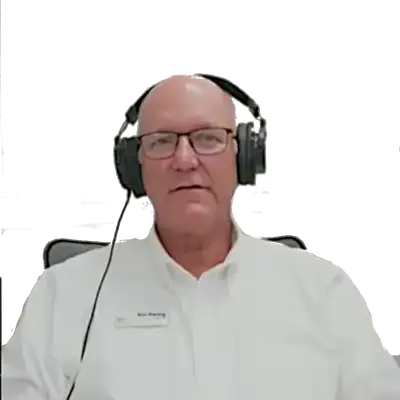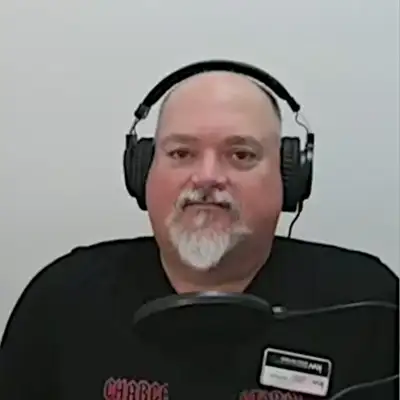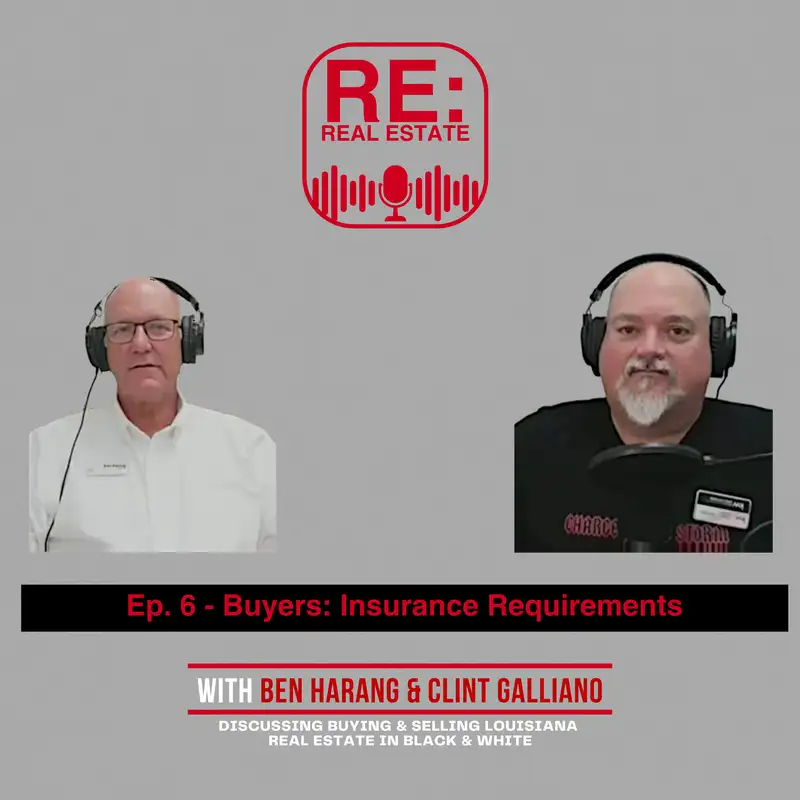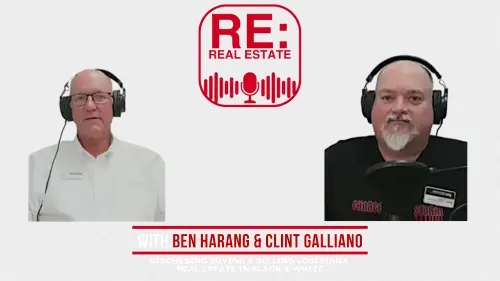Ep6-Buyers: Insurance Requirements
Ben Harang (00:25)
Hey Clint, how you doing today?
Clint C. Galliano (00:29)
I'm doing wonderful, Ben How you doing?
Ben Harang (00:31)
I'm doing terrific. It's sun shining outside, it's middle of winter. Well, I don't guess it's quite winter yet, a couple of more days, but it's shirt sleeve weather and it's nice outside. So it's a good day to be alive.
Clint C. Galliano (00:50)
And seems almost like August came back to visit.
Ben Harang (00:54)
Yeah, yeah, but I can't lose my jacket. I can't leave my jacket somewhere if I don't leave my house with one. So what we talking about today Clint?
Clint C. Galliano (01:01)
you
Well, we're talking about insurance, homeowners and flood insurance.
Ben Harang (01:10)
All right, why would you want to buy insurance on a house you're going to buy? Let's see, I guess the short answer would be you can't get a loan without a homeowners policy on it. It's typically required by the lenders and you need proof of it or it needs to be in force the day you sign the closing documents and buy the house.
And there are multiple companies that are writing horror stories about insurance. I'm hoping that 2025 will bring a change with more competition and more companies writing homeowners policies in Louisiana with some of the changes that were made in the legislature in Baton Rouge in 2024. So hopefully the homeowner insurance issue will improve in 2025.
I guess time will tell how many more companies come in and what happens to the rates.
Clint C. Galliano (02:18)
Yeah, I'm looking forward to it. I know there's a lot of people that they're not liking the insurance. guess the good news is that since the Ida, this is the first year that my insurance hasn't gone up by at least 30%. So that's a big plus.
Ben Harang (02:44)
the increases have definitely
moderated.
Clint C. Galliano (02:48)
It seems like the carriers that are writing are getting comfortable with the rates. The rates they're charging are equaling to their perceived risk. So hopefully that'll balance out. So getting back to why you need it, you you mentioned that if you're using a loan that they're going to make you buy it.
because they want to make sure the property is insured in case of some type of natural disaster or some type of accident or what have you. But it's also to protect you against just general property damage, liability claims, and loss of personal belongings. Yeah, so it's a little bit more than just
lender requirements. I used to work with a guy that he was telling me about his son was attending LSU and there was a kid in the dorms that went nuts and was going from room to room in the dorms and fighting with people, attacking him. And his kid grabbed a baseball bat and hit the nutcase in the head with the baseball bat.
Ben Harang (03:45)
all...
Probably stopped
him.
Clint C. Galliano (04:11)
He stopped him. He did stop him. He knocked him out. Cops came and arrested him, took him away. Well, that kid's family sued my former colleague. And he was getting ready to go to court and he didn't have to do anything. His homeowner's insurance took care of everything and fought it in court. And he...
Ben Harang (04:13)
Mm-hmm
Right.
Clint C. Galliano (04:36)
didn't even have to go to court. They took care of everything for him because it.
Ben Harang (04:39)
whether they paid anything or not, took
care of it.
Clint C. Galliano (04:43)
Exactly. So that's the additional benefits
of homeowners insurance policies.
Ben Harang (04:50)
Yeah, whether
or not you have a loan, ought to have a homeowner's policy on your house. It provides the liability for you. It provides contents coverage for the stuff, whether you need it or not, things that you have in your house, furniture, clothes.
It'll provide coverage for that as well as additional living expense, which is if you have to move out of your house while the house is being repaired because it's been damaged, they'll pay for you to live in a rent house or hotel room, motor home in your driveway from Ida. We saw a lot of people displaced after Ida while their house was being repaired.
So it's a good idea to have the homeowners whether you have a loan on the house or not.
Clint C. Galliano (05:40)
Unless you're independently wealthy and self-insured.
Ben Harang (05:43)
Well,
but you do that by choice. You don't do it just because you don't want to pay that extra $400 premium.
Clint C. Galliano (05:55)
So some of the things that, you know, we see variations in pricing for homeowners insurance. had a client contact me last week. They were interested in a couple of properties in Chauvin and
The homes were, one was at $125,000, that's what it's listed on the market. The other one was like $139,000. So some fairly inexpensive homes. And I don't know which home she got a quote on, and I'm assuming it's the cheapest insurance quote she got, $22,000 a year for homeowners insurance.
Ben Harang (06:28)
Mm-hmm.
Well, yeah, you know people are not gonna pay that that kind of kind of money they're not gonna pay over $1,500 a month for for homeowners policy But what you what you may be able to do is if if homeowners is is Out of reach financially and you still want to buy the property
you can buy what's commonly referred to as a fire policy with extended coverage on it. It's a basic policy. It doesn't provide liability coverage. It doesn't provide contents coverage, but it does satisfy the lender's requirement. depending on where you are, you might be able to find that policy a little cheaper than a homeowner's.
And sometimes they'll exclude the wind and hail coverage for a windstorm and you need to go to LA citizens to get the wind and hail coverage to satisfy the law. But the package for a fire policy may be cheaper than a comprehensive homeowners policy. The coverage is significantly less, but it might help you get into the house and get your feet on the ground and then you can convert it to a homeowners policy later on.
Clint C. Galliano (08:07)
Yeah, it's something to get you into the house and get you covered, know, satisfy the requirements until a point in time where the rates may go down.
Ben Harang (08:20)
Yeah, well, it's just a little bit from my insurance background. I'm not giving insurance advice. Just have a conversation with the insurance agent about alternatives, whether it's a package policy or a standalone policy and price it out. We talked a lot about lenders in a previous podcast. Talk to them and...
Clint C. Galliano (08:20)
That's interesting.
Right.
Yeah.
Ben Harang (08:45)
really find one that you're comfortable with and have a heart-to-heart conversation with them and get their best price and then you know just to keep people honest make some more phone calls and see if anybody else can can match it or beat it and then make a decision and go with it.
Clint C. Galliano (09:08)
So think about the pricing.
Chunk of it is based on your credit score. The location is probably the biggest determining factor in what it's gonna cost for your insurances. But they also take into account how old the home is, the construction type, and the big thing that everybody's talking about right now is whether or not it's got a fortified roof.
even if it's not a fully fortified roof, if it's been built within the last 10 years or less, it's likely going to have cheaper insurance because it's following a much more updated code than older homes. And so the insurance companies feel a lot more comfortable insuring it. So they'll do it for cheaper.
And so that's kind of the components of what influences the cost on the premiums for insurance. So that's why we look at a house in Chauvin that might have a $22,000 a year premium. And then we look at a new construction home that might have less than $2,000 a year. And that's why you have that difference.
Ben Harang (10:13)
No doubt
Right.
Just
when you, if you're to buy a house anywhere, go in with your eyes wide open and price the insurance even before you make an offer on the house. you know, you can at least get an idea of what it would be. so you don't get it under contract and realize, Whoa, I'm not paying $1,500 a month just for a homeowner's policy.
You'll know that before and if you want to do it, that's fine. And if you don't want to do it, then you don't pursue that house.
Clint C. Galliano (11:02)
So.
That's, I think we've homeowners insurance fairly decently. The other factor to look at when buying a home is whether or not flood insurance was required. You know, we hear, I'm sure you hear it all the time too. I don't want to live in a flood zone, you know, with most people not understanding that.
Everywhere is a flood zone.
Ben Harang (11:36)
Yeah, the entire country is mapped out into different flood zones. So when people say, don't want to live in a flood zone, I don't want to buy a house in a flood zone, what they really mean is they don't want to buy a house where they're required to buy flood insurance. And that's good. But just because you're not in a zone that requires flood insurance does not mean your house is going to flood or not going to flood.
And if you buy a house in a zone that requires flood insurance, it does not mean that your house will flood. You can look at the past history of the house and the drainage projects and things that are going on. Every time a storm passes, fewer and fewer houses are flooding. So it's a matter of affordability rather than will the house really flood again or not.
If house floods, chances are it might flood again. But the last, I think it was Ida that there were no houses that flooded as a result of Hurricane Ida in 21. It was all wind damage. It came close, but the levees held, the locks held, and the improvements being made every day.
So, and if you're in a, if you like a house that's in a flood zone that requires flood insurance, there are ways to deal with it that may surprise a lot of people. If you want to have a conversation about that, Clint or I'd be happy to talk to you about it. Give us a call, email us. And we can sit down and have a conversation about what we can do to maybe help.
with that. So that's just something that that buyers agents in general can help with just from a from an experience standpoint.
Clint C. Galliano (13:39)
and we're always happy to help. So just reach out. We'll have our contact info in the show notes. if you do need to reach out with questions or you can comment that too. So we've talked about homeowners insurance from the perspective of owner occupants.
Ben Harang (13:40)
Always, that's what we do.
Yeah.
Clint C. Galliano (14:05)
I just want to touch a bit on the difference if you're buying a home as an investment property to rent out or to flip. Insurance requirements are not really requirements, insurance products available. You can get what's called a landlord's insurance policy. It'll cover rental.
properties, covers the dwelling and it provides a liability coverage, but it does not cover contents. A lot of our carriers that provide these, they are at a little bit of a premium to what a owner-occupant homeowners policy is, but it's not a whole lot different.
That's something that you can look at for that. And then this is for if you've got rental properties or you're doing flips, you can also look at vacant property insurance. This is a policy for when no one is living in the home, say you're doing turnover on a rental or you're doing a flip and doing rehab or repairs and no one's living in the property.
because that's kind of a key component with landlord insurance. And I guess it's with homeowners insurance also, is that the insurance company wants to make sure that someone's living in the property. If not, then they'll want you to move over to a vacant property product.
Ben Harang (15:49)
In the premium for a vacant property is Generally you pay it quarterly and what you pay quarterly on a vacant property Is generally the annual premium For homeowners that that's not vacant. So you you're typically gonna pay somewhere three to four times as much money for vacant property for insurance as you would
if you just bought the homeowners. that reminds me of one other thing, Clint. Forced placed insurance. So if you buy your house today and you have a homeowners policy on it and the premium goes up to where you just said, no, take a hike. I'm not buying that. The lender has the right to put in place what they call forced placed insurance, which is more expensive than a homeowners policy. And it gives you absolutely no coverage.
It only protects the lender's interest in the mortgage that they have on the house. So I remember talking to one person that said, I can't afford it. I can't find it. So they just put insurance on it for me. I said, no, run to an insurance agent right now and get a homeowner's policy and cancel that forced place policy. Because if you can't afford your homeowner's policy, you absolutely cannot afford the forced placed policy that the lender is going to put on your house.
Clint C. Galliano (17:20)
Yeah, because it gives you no coverage. The carrier that I've got my insurance with for my rental properties, they have the option. It's specific for rental or, well, basically real estate investors. They've got a forced place insurance property or option. So
you know, if you've got a property that say you're owner financing and the buyer's still paying you, but they don't have insurance on it, then you can get a forced place policy through them. So, and like you say, it's not cheap.
Ben Harang (18:00)
Right. No,
no, that just, that's when things start spiraling out of control and house ends up at a Sherriff's sale for foreclosure. And that's never fun. So keep your homeowners policy on house. That's the bottom line. So.
And we do have some tricks about flood insurance. So if you have any questions, call Clint or I and we're happy to talk. Email us, leave a comment in the description. Find us, search for us online. We're pretty easy to find if somebody wants to talk to us. like, subscribe and...
Share it. just we just two guys in South Louisiana that are actively in the real estate business that are doing this podcast as a as a public service and to market ourselves So if you find value in and what we're doing Liking and sharing sharing the podcast help
Clint C. Galliano (19:09)
Yeah, and also it lets us know that you're enjoying it.
Ben Harang (19:15)
All right, what else? What else, Clint?
Clint C. Galliano (19:16)
All right, then.
I think that's about it. Until next time.
Ben Harang (19:20)
All right. All right.
Well, have a good afternoon.
Clint C. Galliano (19:25)
You Too, Ben Bye Bye
Ben Harang (19:26)
See you.
Creators and Guests



